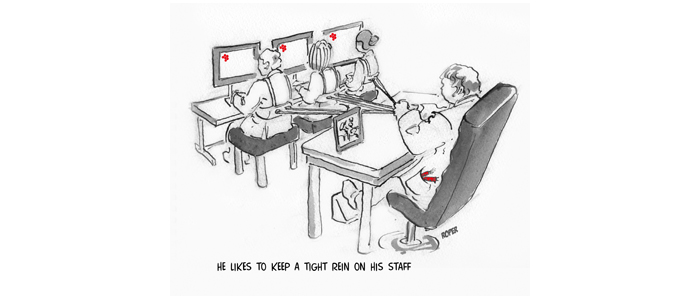When you rise up an organisation’s ladder, your job changes. You find yourself responsible for your staff’s development as well as company performance. We look at how your mindset needs to shift in order to be successful in this new role, one where being a manager, not an operator, is increasingly crucial.
“I never get time to do my job without someone interrupting.”
“I’m an engineer, software expert, accountant (fill in the gap) – I didn’t sign up for this”
How often do you find yourself thinking these thoughts – common complaints from expert people who have found themselves at the top of their tree? The job seems to have changed; it’s no longer about your specialism. You’ve got a team to manage, paperwork to do, and meetings about running the organisation, when all you really want to do is ‘get on with the job’. What’s going on?
The prevailing mindset
Sheila is Managing Director of a rapidly growing engineering company. She’s a marketing specialist, and has enjoyed growing her company from a small start up to the respected player it is today by using her skills. The company has more than tripled in size in the last five years.
But now, from Sheila’s point of view, it’s all gone wrong. She no longer has time to do market research, think of new ideas and get out to meet clients. Somebody always needs her advice, or to check something, or to resolve an issue. She expects her management team to get on with their work without interrupting her, and cannot understand why they seem to need to talk all the time.
Sheila’s company has grown beyond the start-up phase. They are no longer a group of individuals holding the operation together by the skin of their teeth. The larger organisation has become an organism, like a hive. The bees in a hive need to communicate up, down and across the hierarchy, to maintain relationships, manage work, and ensure each of them is doing exactly what they should for the whole organism to thrive. What sounds to Sheila like insecurity (they keep asking her and each other questions) and chit chat (they swap information and ideas on what they are working on) is actually the sound of a busy working team doing its job.
Sheila hasn’t understood that her success in growing her business has caused her entire role to change. She’s still trying to do the old job, deepening her professional knowledge and coming up with innovative new ideas. Management feels like an irritating interruption to what she still thinks of as her day-job.
A more productive mindset
Sheila now needs to learn to deliver marketing and sales to her organisation, not personally, but via her management of her team. In fact, team members’ training and development as future leaders of the organisation is also a crucial part of her new role. This is a hugely misunderstood mechanism in growing organisations. Senior leaders hang on to getting their hands dirty sorting out things on the factory floor, or shut the door on their team to ‘get on with the job in peace’. They are working for organisational growth with very little real grasp of the true magnitude of the change they need to embrace.
Your whole job changes as you rise to the top. You become responsible for the organisation’s performance, and the experience and career development of staff. You have to learn how to deliver your expertise through other people. Management is an increasingly large part of the day-job, not something you can do during your spare time after you’ve finished your specialist role. If you resent every minute spent away from the day-job, like Sheila, you are missing a crucial truth – you are no longer doing your job properly.
Clients often tell me they do their planning, forecasting and performance management in the evenings, “because it’s the only time I get to think about it properly”. This mindset gives away their assumption that their specialism is the real day-job: ‘management’ is what you do when you find the time. And that’s those who even do it at all; many just don’t, because it’s difficult, they resent the time, and they don’t think they have the skills, until it all blows up in their face and they have to do something or end up in court.
You might have to give some thought to whether you really want that senior management position after all. It’s not about indulging your preferences: there’s a job to be done, a specialism in its own right. If you don’t want it, step aside: make space for others to come through who love managing and nurturing people. Your organism needs a custodian, and if it isn’t going to be you, make room for somebody better suited than you to do the job that needs doing.
Want to read more of the same? Then click on the graphic below to receive a monthly round-up of leadership and organisation development articles direct to your inbox:

